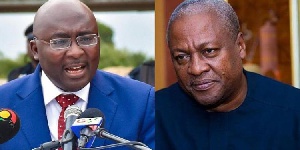In the political amphitheater of Ghana, the issue of intellectual property and originality of ideas among presidential candidates has become a fervent topic of debate. A striking case is that of Dr. Mahamudu Bawumia, the Vice President of Ghana, who has been copying ideas from his predecessor, John Dramani Mahama.
These allegations are not superficial but are rooted in various instances where Dr. Bawumia's promises and initiatives directly mirror those of President Mahama.
Campaign Promises: A Reflection of the Past?:
Dr. Bawumia’s political career, particularly his campaign promises, has drawn significant scrutiny. His campaign promises are often eerily reminiscent of initiatives previously introduced or proposed by John Mahama during his presidency or in his campaign tour.
This raises questions about the originality and authenticity of Dr. Bawumia's political agenda. For instance, Dr. Bawumia has been vocal about his commitment to infrastructure development, a pillar that was staunchly advocated by John Mahama.
He is known for his extensive infrastructure projects like schools, hospitals, and roads across the country. Other promises of John Mahama that Dr. Bawumia has clandestinely copied are one million jobs for coders, allowances to chiefs,
cancellation of e-levy and other obnoxious taxes imposed by the Akufo Addo/Bawumia government.
These suggest that Dr. Bawumia’s approach lacks novelty and originality. He is
only good at repackaging old ideas as new promises to the Ghanaian electorate.
The Digitization Debate:
One of the most contentious issues is Dr. Bawumia's claim to the digitization initiative in Ghana. While Dr. Bawumia has been a strong proponent of transforming Ghana into a digital economy, it is crucial to note that the foundation for many of these digital advancements was laid during John Mahama's tenure.
For example, the significant improvements in digital infrastructure and the introduction of several e-services, including the e-justice system and the digitization of the Ghana Health Service, e-passport, and port services, were initiatives that began under Mahama’s administration. Dr. Bawumia’s claims often overshadow this continuity, painting a picture of novel achievement rather than a progression of existing frameworks.
Dr. Bawumia's frequent heralding of these projects as landmarks of his and his party's vision strikes a discordant note among observers who recognize them as continuations of past projects. The question then arises: Is it fair to label these efforts as pioneering when they may well be considered an extension of previous work?
Ethical Considerations and Political Integrity:
The allegations of plagiarism in politics are severe, given that they undermine the integrity of the political process. In academia, plagiarism is a cardinal sin, and similarly, in the political realm, the authenticity of ideas plays a crucial role in maintaining public trust and respect.
When political figures are accused of copying their rivals' ideas, it not only tarnishes their reputation but also raises doubts about their capability to innovate and lead independently.
Conclusion:
While continuity in policy is not inherently negative, the issue lies in Dr. Bawumia’s tendency to present these ideas as original, thereby potentially misleading the electorate about the novelty and creativity of his political vision. The ongoing controversy surrounding his appropriation of John Mahama's ideas is more than a political skirmish; it is indicative of deeper issues within political ethics and governance.
It challenges the Ghanaian electorate to consider not just the promises made by Dr. Bawumia but also the originality and sincerity behind them. As Ghana
the country continues to evolve, it becomes imperative that its leaders offer not just development but also authenticity in their political engagements. The echo of past ideas might resonate with familiarity, but it is the fresh, innovative plans that truly drive progress.
Opinions of Wednesday, 5 June 2024
Columnist: Cletus Siebune



















